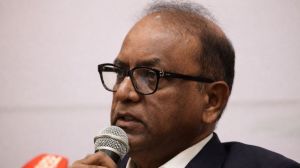Neighbour as peacemaker
There is increasing realisation in New Delhi that India cannot keep aloof from the events in Sri Lanka. And that, sooner than later, it wi...

There is increasing realisation in New Delhi that India cannot keep aloof from the events in Sri Lanka. And that, sooner than later, it will have to play a role consistent with good neighbourliness and India8217;s security and strategic interests. The alternative is to let other powers make a foray into Sri Lankan territory, which will not be in the country8217;s long-term interests.
Both the parties concerned the Sri Lankan government and the Liberation Tigers of Tamil Eelam LTTE have admitted, if not in so many words, that India is the one country which can play a decisive role in bringing about peace in the island nation. Both Norway, which has been in the forefront of brokering a peace deal, and the United States, which is keen to lend a helping hand to the peace process, recognise India8217;s role.
However, the country8217;s present stance of 8220;complete neutrality8221; is dictated in the main by two factors: the nightmarish experience over the deployment of the Indian Peace Keeping Force IPKF in Sri Lanka in the mid-eighties and the political pressure from some of the constituent parties of the National Democratic Alliance government. It is often forgotten that involvement does not necessarily mean taking sides in the ongoing conflict.
India has already made it clear to both the interlocutors and the parties concerned that under no circumstances will it involve itself militarily in the Sri Lankan situation. After all, as the IPKF experience had taught it, any military involvement can only be counter-productive. While recognising this, India cannot shy away from its responsibility as a well-intentioned neighbour. In other words, nothing prevents the Indian government from providing humanitarian assistance to the war-affected people. It is still a matter of conjecture as to when Jaffna falls to the Tigers. But the Sinhala troops are sure to lose control of the town, of that there is no doubt. In such an eventuality, the 40,000 or so Sri Lankan troops now amassed in the Jaffna peninsula will become sitting ducks for the LTTE.
This is too frightening a scenario to contemplate and it should not be allowed to happen. It is in the evacuation of these troops that India can help. How far evacuation is possible without the cooperation of the LTTE is, of course, a matter of speculation.
Ideally, the evacuation should be preceded by a ceasefire. This will make India8217;s task easier. Thus one of the main objectives of the peace-brokers should be to bring about a ceasefire. Given the intransigence of the parties concerned, this is easier said than done. In the past, the efforts to bring about a rapprochement between the LTTE and the Sri Lankan government could not succeed precisely because of the lack of confidence the Sinhalas and the Tamils have in each other.
This means countries like Norway and India are up against a wall in their bid to bring the warring sides to the negotiating table. On the settlement of the ethnic dispute, whether it should be through partition, as advanced by the LTTE, or devolution of power as conceded by the Sri Lankan government, is for the people of Sri Lanka to decide. Whatever be the case, India8217;s role cannot be any different from what the people of Sri Lanka want it to be. This is the basic premise on which India should make its moves.
- 01
- 02
- 03
- 04
- 05































